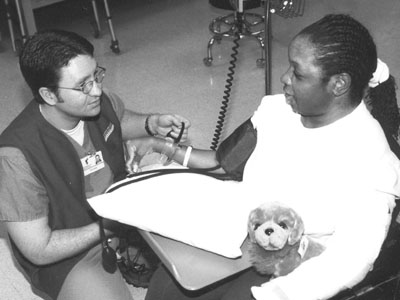VICKSBURG, Miss.—Three days a week, Gary Stavely volunteers as a nurses’ aide on the same floor at Methodist Rehabilitation Center where he was a patient himself.
It’s an irony not lost on the young emergency room nurse, who is on the road to recovery after suffering a traumatic brain injury.
“It feels great to be working, but it’s really nice to be doing it here where they cared so much for me already,” Stavely said. “I can return some of the care I got.”
Stavely and a pal were injured after a long day of hunting, when they hitched a ride on top of a bush hog being pulled by a tractor. Stavely will be the first to tell you it wasn’t the brightest idea he’d ever had.
“The tire of the tractor got caught and wrapped around a vine and eventually pulled a tree down on top of us,” he recalled. “I got hit in the head and my buddy got hit pretty hard too.”
After 10 days in intensive care, Stavely arrived at Methodist Rehab in Jackson. At the time, walking and remembering simple things were serious challenges.
“We had to work hard just to get him in and out of bed,” said Ella Payton, a rehab technician who cared for Stavely. “It’s always hard for patients with brain injuries, but Gary worked hard to recover.”
As Stavely improved, he began participating in Methodist Rehab’s Quest program. It was a big step toward getting him back where he wanted to be—caring for others.
Quest focuses on returning those with brain injuries to their jobs and communities. “A team of physical, occupational and speech therapists work with physicians and neuropsychologists to help patients improve in a setting that’s more tailored to their individual needs than a hospital environment,” says Quest coordinator Joyce Leverenz. “We set goals for our patients and work on specific skills they may need to get their lives and jobs back.”
When he arrived at Quest, he had no immediate memory, said occupational therapist Charlene Toney. “If you took him from one room into another, he couldn’t remember how to get back to the first room,” she said.
Improving his memory became the first concern for the Quest team. “We made checklists for him to use at work and we stressed the importance of repetition,” said speech therapist Cassie Means. “Most people use routines and day planners to manage their day, but when you’ve had a head injury the challenge is to remember to remember those things. That’s part of what we worked with Gary on.”
As an example, therapists would have Stavely read a short story and then ask him questions about the plot to test his recall. As he improved, the team sought to get him back to work.
Through Quest, Stavely had a chance to work as a nurse again. And it wasn’t hard to find a place willing to take him on.
Payton, the technician who cared for Stavely during his inpatient stay, has become his supervisor. During his shifts, Stavely carries a notepad and a list to document tasks that he performs and make helpful reminders of ways to do them better.
“It’s so great to see him doing so well and working so hard,” Payton said. “We didn’t know what a good nurse he was when he was lying in that bed, but now we see how much the patients like him and how seriously he takes what he’s doing.”
The plan is to resume his work as an emergency room nurse at Parkview Regional Medical Center in Vicksburg. It won’t be easy to take on that much responsibility and it won’t happen quickly, but Stavely says he’s ready to do whatever work is necessary to get back there.
“I know it’s going to be tough, but that’s the work that I really enjoy. You never see the same thing twice. Each day when you get to the hospital, you don’t have any idea what’s coming through those doors,” he said. “I miss it and I want to be there again.”

